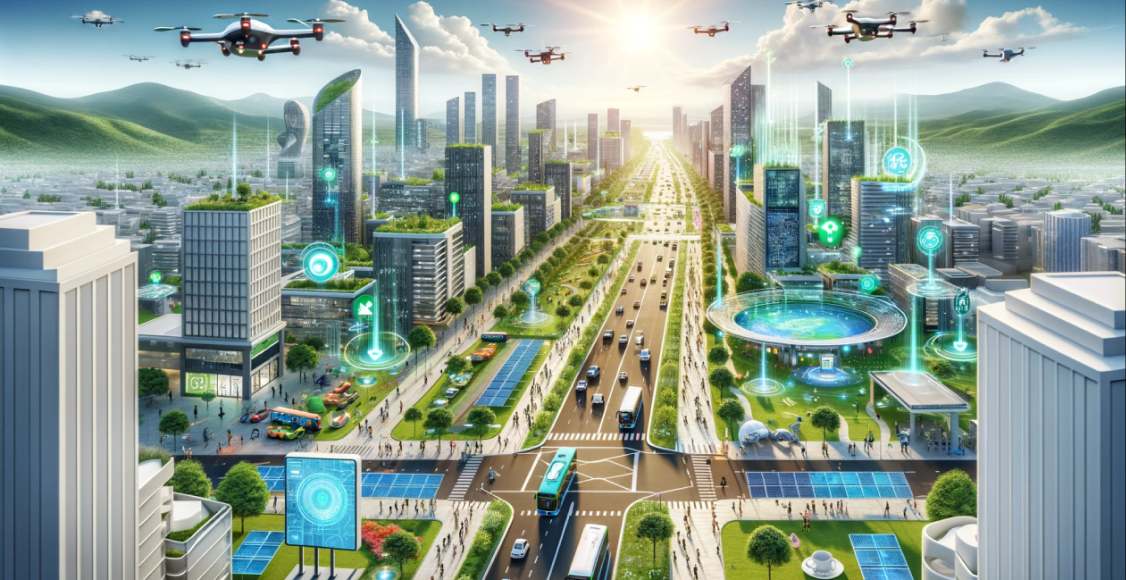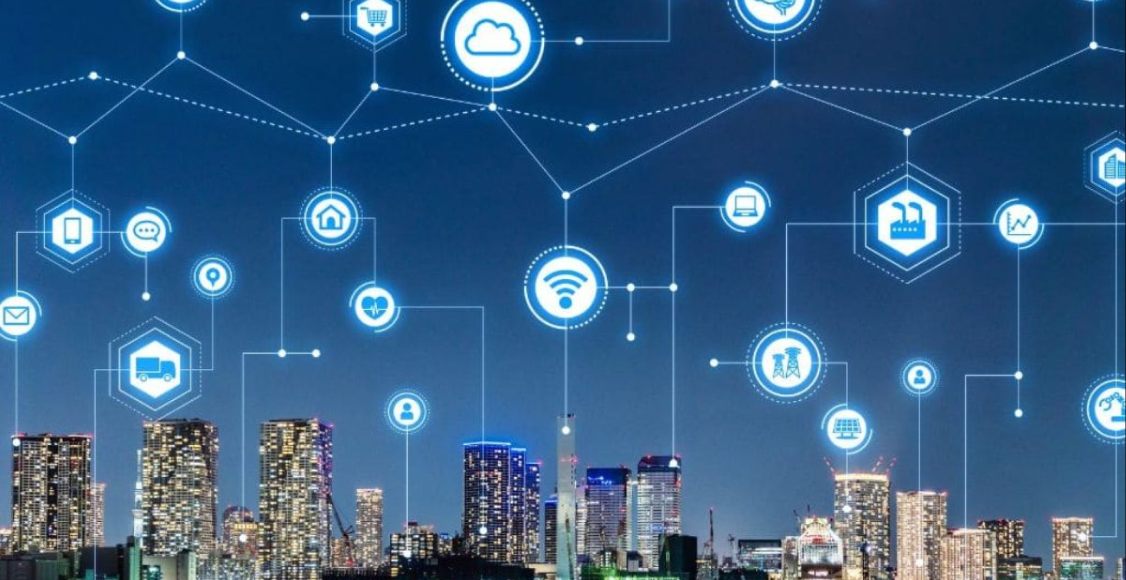We build digital products to help businesses succeed!
Introduction
Imagine a world where cities are not just smart, but intuitive, learning and adapting in real-time. This is the promise of Smart Cities AI—a future where artificial intelligence seamlessly integrates into the fabric of urban life. With AI urban management, cities are set to become more efficient and sustainable than ever before. The global smart city market is on a trajectory to reach a staggering $2.57 trillion by 2025, signaling a paradigm shift in how we manage and inhabit urban spaces.
According to Gartner, over 30% of smart city applications by 2025 will be AI-driven, revolutionizing everything from traffic control to waste management. These sustainable AI solutions are not just about technology; they’re about creating ecosystems that enhance the human experience. As we stand on the brink of this urban renaissance, let’s explore how AI is not just shaping, but redefining the future of our cities. With this blog, we will help you navigate through the intricate role of AI in developing smart city infrastructure, its profound benefits for urban management, and the ways it can uplift sustainability and living standards.
Smart Cities Explained
Smart cities are technologically advanced urban areas that leverage information and communication technologies to foster economic growth, enhance quality of life, and streamline city management. They upgrade infrastructure with cutting-edge solutions, optimizing services while minimizing costs and resource use. Artificial intelligence (AI) elevates smart cities by improving efficiency and intelligence, benefiting residents and businesses alike. For instance, interconnected systems and sensor-equipped buildings enhance access to public resources.
Recent researches outlines a smart city’s structure in three layers:
a) The foundational layer of data-collecting devices
b) The analytical layer for processing this data
c) The interactive layer where people use these insights
Together, these layers create a responsive, sustainable urban ecosystem, setting a new standard for living and governance. Smart cities represent the future of urban living, where technology and sustainability converge to create intelligent, prosperous communities.

The Role of AI in Smart Cities
At the forefront of urban innovation, Smart Cities AIis reimagining the infrastructure of our urban environments. The role of AI in smart cities extends to every corner of urban planning, from the electricity that powers our homes to the traffic lights that guide our commutes. By leveraging sustainable AI solutions, cities are transforming into ecosystems that are not only intelligent but also adaptable to the ever-changing needs of their inhabitants. Additionally, AI-powered systems facilitate better traffic management, energy consumption, waste management, public safety, and overall urban planning. Through its advanced capabilities, AI plays a crucial role in making cities smarter, more adaptive, and better equipped to meet the evolving needs of their residents.
Smart Solutions for Smart Cities: How Exactly AI Contributes in Making Cities Smarter?
Smart city solutions powered by AI are not just about automation; they’re about evolution. As AI algorithms improve daily, they learn from citizens’ interactions, leading to enhanced urban planning and management. This continuous learning process allows AI to uncover hidden patterns, enabling municipal governments to proactively meet the needs of their citizens.
- Data as the Foundation of Smart Urban Intelligence: Cities are data goldmines, with vast amounts of information generated from public transportation, municipal taxes, police records, traffic sensors, and weather stations. The challenge lies in harnessing this data to yield actionable insights for city improvement.
- The Role of AI in Data Synthesis and Insight Generation: AI steps in to manage the deluge of data from diverse sources. By processing and analyzing this information, AI reveals insights that enhance the efficiency of municipal operations and reduce costs.
- Optimizing Public Infrastructure with AI: Often, a city’s public infrastructure is underutilized, overutilized, or inefficiently employed due to a lack of real-time information. AI-powered smart city systems analyze data across municipal services to optimize usage and address issues ranging from traffic congestion to crime1.
- AI: A Catalyst for Citizen-Centric Urban Development: AI supports citizen-centered programs by welcoming public input and making effective use of existing resources. It’s a tool that transforms cities into responsive, adaptive, and intelligent environments for their inhabitants
5 Ways Artificial Intelligence Can Be Used Within Smart Cities
In the realm of Smart cities AI, the fusion of technology and urban planning has given rise to innovative AI urban management strategies, leading to sustainable AI solutions that redefine the fabric of our cities. Here’s an elaboration on the five key applications of AI within smart cities:
1. Enhanced Security:
AI-powered security cameras are revolutionizing urban safety. Unlike traditional cameras, these smart devices analyze footage in real-time, identifying criminal behavior as it happens. This immediate detection allows for quicker response times and helps in preventing crimes before they escalate. Moreover, AI can assist in suspect identification by analyzing clothing and physical features, streamlining law enforcement efforts.
2. Proactive Maintenance:
The role of AI in smart cities extends to infrastructure maintenance. Companies like RoadBotics are leveraging AI to assess infrastructure conditions. By analyzing road imagery, AI can pinpoint issues and suggest cost-effective solutions. This predictive maintenance ensures that cities can address problems before they worsen, saving money and enhancing safety for citizens.
3. Intelligent Traffic Management:
AI systems are adept at managing and optimizing traffic flow by processing real-time data from various sensors across the city. This leads to reduced congestion, faster emergency response times, and more efficient public transportation, ultimately contributing to a smoother urban commute.
4. Smart Waste Management:
Public bins equipped with AI-driven sensors can monitor waste levels, significantly reducing overflow and maintaining cleaner city streets. This system not only improves urban cleanliness but also optimizes waste collection routes and schedules, leading to more efficient resource use.
5. Advanced Public Transportation:
The efficiency of public transport is a testament to how AI can help in sustainable development. It is a game-changer for public transport, providing real-time updates and tracking to ensure punctuality and improve route planning. Future advancements like automated buses promise to reduce emissions, enhance route efficiency, and increase the frequency of services, all while maintaining high levels of customer satisfaction.

AI Use Cases: Success Stories in Urban Management
The narrative of smart city AI use cases is rich with success stories that exemplify AI’s transformative impact. Success stories where AI has made a significant impact include:
- Public Transportation: AI applications assist in optimizing bus networks, providing real-time schedules based on passenger volume, improving the overall public transport experience.
- Air Quality Monitoring: Networks of sensors powered by AI provide real-time air quality data, enabling cities to take proactive measures against pollution and other environmental hazards.
- Public Safety Enhancements: AI-driven surveillance systems in cities like London and Chicago have improved public safety by enabling quicker response times and more accurate crime prediction and prevention strategies.
- Healthcare Accessibility: In Singapore, AI-powered health kiosks and telemedicine services have increased healthcare accessibility, allowing for early detection of health issues and reducing hospital wait times.
- Energy Efficiency: Tokyo has implemented AI in its energy systems to predict and manage electricity demand peaks, significantly reducing energy consumption and carbon footprint.
- Waste Management Optimization: Barcelona’s smart waste management system uses AI to optimize collection routes and schedules, resulting in reduced operational costs and lower emissions from waste collection vehicles.
- Water Conservation: AI-enabled water management systems in Cape Town have helped prevent water shortages by predicting usage patterns and detecting leaks, ensuring a sustainable water supply for the city.
We see that cities around the globe are harnessing AI for sustainable solutions for air pollution, employing smart sensors and AI algorithms to monitor and improve air quality. Similarly, AI-driven sustainable solutions for traffic management are revolutionizing the way we navigate urban spaces, reducing commute times and emissions. These stories are not just testaments to AI’s potential but beacons guiding us towards a smarter, more sustainable urban future.
Elevating Living Standards with AI
The dawn of Smart Cities AI is not just transforming urban landscapes; it’s elevating the very standards by which we measure quality of life. In these technologically advanced metropolises, AI urban management systems are the silent sentinels, ensuring that the city’s heartbeat matches the rhythm of its residents’ needs. From intelligent traffic systems that slash commute times to AI-driven public safety measures that make neighborhoods safer, the benefits are palpable. These sustainable AI solutions are not mere conveniences; they are essential components that enhance the day-to-day experiences of every citizen.
How AI Helps in Sustainable Development?
Sustainable development is a global imperative, and AI is a potent ally in this mission. Smart cities AI contributes to sustainable development by optimizing resource use and reducing waste. For instance, AI algorithms manage renewable energy sources in real-time, balancing supply and demand to minimize carbon emissions. In agriculture, AI-driven precision farming techniques are increasing yields while conserving water and reducing the need for chemical fertilizers. These examples underscore the role of AI in smart cities—as a force multiplier for sustainability.

Smart City Living: A Glimpse into the Future
Imagine waking up in a city where your morning commute is informed by real-time traffic predictions, where your home’s energy use is optimized without a second thought, and where public services respond to issues before they become problems. This is the promise of smart city living. It’s a future where the use of AI in smart cities makes life not just more manageable, but more enjoyable. Smart solutions for smart cities are turning this vision into reality, offering a sneak peek into a future where urban living is synonymous with the smart, sustainable, and serene.
The future of AI technology harbors immense promise for the development of intelligent, eco-friendly urban areas. Tackling hurdles such as data systems, cooperative efforts among stakeholders, and regulatory frameworks is crucial. Moreover, urban centers must focus on inclusivity, confront prejudices, and foster cooperative efforts to guarantee that I advancements reach every citizen. The limitless possibilities offered by AI innovations can lead to substantial progress in establishing sustainable and habitable urban spaces.
Conclusion
Smart Cities AI has proven to be the cornerstone of modern urban ecosystems, where AI urban management is synonymous with efficiency, sustainability, and resilience. The use of AI in smart cities extends beyond mere convenience; it is a transformative force that ensures our cities are adaptable, responsive, and forward-thinking. The promise of smart solutions for smart cities is being realized today, as we witness the harmonious blend of technology and urban life. The role of AI in smart cities is not just about enhancing current systems; it’s about envisioning a future where every aspect of city life is infused with intelligence and sustainability. As we embrace this new paradigm, we can look forward to a world where smart cities, powered by AI, set the standard for living, governance, and sustainable development. The future is not just bright; it’s intelligent, and it’s here.
Offices
India
86P, 4th Floor, Sector 44, Gurugram, Haryana 122003Singapore
#21-02, Tower 2A, The Bayshore condo, Singapore 469974Canada
8 Hillcrest Avenue Toronto ON M2N 6Y6, CanadaUS
31 River CT, Jersey City, New JerseySubscribe to our newsletter
Our Services
Top Reads
India
86P, 4th Floor, Sector 44, Gurugram, Haryana 122003
Singapore
#21-02, Tower 2A, The Bayshore condo, Singapore 469974
Canada
8 Hillcrest Avenue Toronto ON M2N 6Y6, Canada
US
31 River CT, Jersey City, New Jersey
Contact us
info@primathon.in
+91-9205966678
Reviews


